- Home
- Jack Kerouac
Dr. Sax Page 2
Dr. Sax Read online
Page 2
“Pauvre vieux Destouches” sometimes they’d call him because in spite of the horrible reports about his health they’d pity him for those rheumy eyes and shuffling, dull gait, he was the sickliest man in the world and had dumb hanging arms, hands, lips, tongue, not as if idiot but as if sensual or senseless and bitter with venoms of woe … an old dissipate, I can’t tell what kick, drug, drunk, illness, elephantiasis or whatall he had. There were rumors that he played with the dingdangs of little boys–would go back there in the gloom offering candy, pennies, but with that dull, sick sorrow and weary face, it no longer mattered– obviously all lies but when I went in there to buy my candy I was mystified and horrified as if in an opium den. He sat on a chair, breathing with a bestial dullmouth honk; you had to get your own caramels, bring the penny to his listless hand. The dens I imagined from The Shadow magazines that I bought there. They said he played with little Zap Plouffe. . . Zap’s father Old Hermit had a cellarful of Shadows that one time Gene Plouffe gave me use of (about ten Shadows and sixteen Star Westerns and two or three Pete Pistols I always liked because Pete Pistol looked simple on his covers though hard to read)—buying Shadows at Old Leper’s candy store had that mixed quality of the Plouffe cellar, there was old dumb brown tragedy in it.
Next to the candy store was a shop, ribbons for sale, ladies of the sewing afternoon with pendant ringlet wigs advertising round blue-eyed mannikin doll-heads in a lace void with pins on a blue cushion … things that have turned brown in our father’s antiquity.
9
THE PARK RAN CLEAR to Sarah Avenue across backyards of old Riverside Street farms, with a path in the middle of the high grass, the long block wall of the Gershom garage (lovers of evil midnight made blotches and squirting sounds in the weeds). Across the park, at dirtstreet Sarah Avenue, a fenced-in field, hilly, spruces, birch, lot not for sale, under gigantic New England trees you could look up at night at huge stars through a telescope of leaves. Here the families Rigopoulos, Desjardins and Giroux lived high on the built-up rock, views of the city over back Textile field, high-flats of the dump and the Valley’s immortal void. O gray days in G.J.’s! his mother rocking in her chair, her dark vestments like dresses of old Mexican mothers in tortilla dark interiors of stone–and G.J. glaring out the kitchen window, through the great trees, at the storm, and the city faintly etched all redheap white in the glare behind it, swearing, muttering, “What a gad-damn life a man has to live in this hard rock ass cold world” (over the river gray skies and storms of the future) and his mother who can’t understand English and doesn’t bother with what the boys are saying in afternoon goof hours off school is rocking back and forth with her Greek bible, saying “Thalatta! Thalatta!” (Sea! Sea!)—and in the corner of G.J.’s house I smell the dank gloom of Greeks and shudder to be in the enemy camp–of Thebans, Greeks, Jews, Niggers, Wops, Irishmen, Polocks… G.J. turns his almond eyes at me, like when I first saw him in the yard, turning his almond eyes on me for friendship–I thought Greeks were raving maniacs before.
G.J. my boyhood friend and hero–
10
IT WAS IN Centralville I was born, in Pawtucketville saw Doctor Sax. Across the wide basin to the hill–on Lupine Road, March 1922, at five o’clock in the afternoon of a red-all-over suppertime, as drowsily beers were tapped in Moody and Lakeview saloons and the river rushed with her cargoes of ice over reddened slick rocks, and on the shore the reeds swayed among mattresses and cast-off boots of Time, and lazily pieces of snow dropped plunk from bagging branches of black thorny oily pine in their thaw, and beneath the wet snows of the hillside receiving the sun’s lost rays the melts of winter mixed with roars of Merrimac —I was born. Bloody rooftop. Strange deed. All eyes I came hearing the river’s red; I remember that afternoon, I perceived it through beads hanging in a door and through lace curtains and glass of a universal sad lost redness of mortal damnation … the snow was melting. The snake was coiled in the hill not my heart.
Young Doctor Simpson who later became tragic tall and grayhaired and unloved, snapping his—“I think everything she is going to be alright, Angy,” he said to my mother who’d given birth to her first two, Gerard and Catherine, in a hospital.
“Tank you Doctor Simpson, he’s fat like a tub of butter–mon ti riange …” Golden birds hovered over her and me as she hugged me to her breast; angels and cherubs made a dance, and floated from the ceiling with upsidedown assholes and thick folds of fat, and there was a mist of butterflies, birds, moths and brownnesses hanging dull and stupid over pouting births.
11
ONE GRAY AFTERNOON in Centralville when I was probably 1,2 or 3 years old, I saw in my child self dream-seeing voids a cluttered dark French Canadian shoe repair shop all lost in gray bleak wings infolded on the shelf and clatter of the thing. Later on the porch of Rose Paquette’s tenement (big fat woman friend of my mother’s, with children) I realized the brokendown rainy dream shoeshop was just downstairs … a thing I knew about the block. It was the day I learned to say door in English … door, door, porte, porte–this shoe repair shop is lost in the rain of my first memories and’s connected to the Great Bathrobe Vision.
I’m sitting in my mother’s arms in a brown aura of gloom sent up by her bathrobe–it has cords hanging, like the cords in movies, bellrope for Catherine Empress, but brown, hanging around the bathrobe belt–the bathrobe of the family, I saw it for 15 or 20 years–that people were sick in–old Christmas morning bathrobe with conventional diamonds or squares design, but the brown of the color of life, the color of the brain, the gray brown brain, and the first color I noticed after the rainy grays of my first views of the world in the spectrum from the crib so dumb. I’m in my mother’s arms but somehow the chair is not on the floor, it’s up in the air suspended in the voids of sawdust smelling mist blowing from Lajoie’s wood yard, suspended over yard of grass at corner of West Sixth and Boisvert– that daguerreotype gray is all over, but my mother’s robe sends auras of warm brown (the brown of my family)—so now when I bundle my chin in a warm scarf in a wet gale—I think on that comfort in the brown bathrobe–or as when a kitchen door is opened to winter allowing fresh ices of air to interfere with the warm billowy curtain of fragrant heat of cooking stove … say a vanilla pudding … I am the pudding, winter is the gray mist. A shudder of joy ran through me-when I read of Proust’s teacup–all those saucers in a crumb–all of History by thumb–all of a city in a tasty crumb–I got all my boyhood in vanilla winter waves around the kitchen stove. It’s exactly like cold milk on hot bread pudding, the meeting of hot and cold is a hollow hole between memories of childhood.
The brown that I saw in the bathrobe dream, and the gray in the shoeshop day, are connected with the browns and grays of Pawtucketville-the black of Doctor Sax came later.
12
THE KIDS YELLING in the tenement yards at night–I remember now and realize the special sound of it–mothers and families hear it in aftersupper windows. They’re slaloming the iron posts, I’m walking through them in that spectral dream of revisiting Pawtucketville, quite often I get in from the hill, sometimes from Riverside. I’ve come wearying out of my pillow, I hear pots rattling in kitchens, complaints of an elder sister in the yard becoming a chant, which the littler ones accept, some with cat meows and sometimes actual cats do join in from their posts along the house and garbage cans–wrangles, African chatters at murky circles–moans of repliers, little coughs, mothermoans, pretty soon too late, go in and play no more, and with my what-woe trailing behind me like the Dragon Net of Bad Dreams I come sploopsing to a no-good end and wakeup.
The children in the court pay no attention to me, either that or because I am a ghost they dont see me.
Pawtucketville rattles in my haunted head …
13
IT IS A RAINY NIGHT, on the Moody Street Bridge there’s poor old millhand Joe Plouffe. The night he was headed for Mill Pond mills with a lunch that he suddenly heaved far up into the night sky– G.J. and Lousy and I were sitting in the F
riday evening park grass, behind the fence, and like a million times there goes Joe with lunchpail beneath brown auras of corner lamp with its illumination of every pebble and puddlehole in the street–only tonight we hear a strange yell, and see him throw lunch with a floosh-up of his arms and walk off, as lunch lands, he’s going to the bars of wild whiskey instead of the mills of drudgery–the only time we saw Joe Plouffe excited, the other time was in a suppertime basketball game, Joe on my side, Gene Plouffe on G.J.’s, the two brothers start hipping each other, whack, unobtrusive grinning use of hips packing great power that can knock you down and when littler Gene (5:01) gave him a good one bigger Joe (5:02) got red-in-face and slammed him a surreptitious hip that had Gene momentarily stunned and red, what a duel, G.J. and I were trapped pale among the titans, it was a great game–Joe’s lunch in fact landed about 20 feet from that very basketball bucket in the tree–
But now it’s a rainy night and Joe Plouffe, resigned, huddled, hurries home at midnight (no more buses running) bent against cold March rainwinds–and he looks across the wide dark towards Snake Hill behind the wet shrouds–nothing, a wall of darkness, not even a dull brown lamp.—Joe goes home, stops for a hamburger in Textile Lunch, maybe he ducked in our wrinkly tar doorway to light his butt– Then turned down Gershom in the corner rain and went home (as tragic roses bloom in rainy backyards of midnight with lost marbles in the mud). As Joe Plouffe lifts his heel from the last wood plank of the bridge, suddenly you see a faint brown light come on far in the night of the river–just about on Snake Hill– and beneath the bridge, slouching, dark, emitting a high laugh, “Mwee hee ha ha ha,” fading, choking, mad, maniac, caped, green-faced (a disease of the night, Visagus Nightsoil) glides Doctor Sax–along by the rocks, the roars–along the steep dump bank, hurrying–flapping, flying, floating, sweeping to the reedy flats of Rosemont, in one movement removing the rubber boat from his slouched hat and blowing it up into a little rowboat–goes rowing with rubber paddles, red-eyed, anxious, serious, in the gloom of rains and bat-spans and roar hush mist-masts—real river–keeping an eye on the Castle–as over the basin of that Merrimac with eager petite birdy wings bat-boned little Count Condu the Vampire hastens to his baggy dusty crumbled old girl in the unspeakable brown of the Castle door, O ghosts.
14
COUNT CONDU CAME FROM Budapest–he wanted good Hungarian earth to lie still in during the long dull afternoons of the Europe void–so he flew to America by rainy night, by day slept in his six-foot sand box aboard an N.M.U. ship–came to Lowell to feast on the citizens of Merrimac … a vampire, flying in the rainy night river from the old dump along back Textile field to the shores of Centralville … flying to the door of the Castle which was located on top of the dreaming meadow near Bridge and 18th. Upon the top of this hill, located symmetrically with the old stone castle-house on Lakeview Avenue near Lupine Road (and the long lost French Canadian hoogah names of my infancy) there stands a Castle, high in the air, the king surveyor of the Lowell monarchial roofs and stanchion-chimneys (O tall red chimneys of the Cotton Mills of Lowell, tall redbrick goof of Boott, swaying in the terminus clouds of the wild hoorah day and dreambell afternoon—)
Count Condu wanted his chickens plucked just right–He came to Lowell as part of a great general movement of evil–to the secret Castle– The Count was tall, thin, hawk-nosed, caped, whitegloved, glint eyed, sardonic, the hero of Doctor Sax whose shaggy eyebrows made him so blind he could hardly see what he was doing hopping over the dump at night– Condu was sibilant, sharp-tongued, aristocratic, snappy, mawk-mouthed like a bloodless simp, mowurpy with his mush-lips swelled inbent and dommer-fall as if with a little hanging Mandarin mustache which he didn’t have– Doctor Sax was old, his strength of hawk-shaw jowls was used on age, sagged a bit (looked a little like Carl Sandburg but shaped with a shroud, tall and thin in a shadow on the wall, not Minnesota road walking open air curly Gawd-damn glad in saintliness days and Peace–) (Carl Sandburg disguised with a dark hat I saw one night in the Jamaica Long Island Negro neighborhood, the Down Stud district, back of Sutphin, walking a long tragic lit up boulevard of islands and mortuaries not far from Long Island railroad tracks, just come in off a Montana freight train)–
The bat dissolved from the air and materialized at the door of the Castle a Vampire Count in evening cape. La Contessa de Franziano, a descendant of Welsh bwerps who fell off a trireme off the coast of Leghorn when it still had its Medieval wall guards, but claiming to be a pure Franconi of the old Medici heirs, came to the door gilt in rapid declining old lace with cobwebs joining threads and dust caking when she bent her back, with a pendant pearl and spider sleeping on it, her eyes all how-low, her voice all verbalisms in a reverberatory vat–“Dearest Count, you’ve come!” — she aims for the door with sobbing arms, opens it to the rainy night and few dull lights of Lowell ’cross the basin–but Condu stands firm, severe, prim, unemotional, Nazi-like, removing a glove–draws breath with a slight poof of the lips and a sniff-up–rattles–
“My dear, unemotional as I allegedly may be I’m sure the antics of the gnome girls don’t rival yours when old Sugar Pudding comes home.”
“Why Count,” tinkles Odessa the slave girl (Contessa in a camp) “how you do manage to be vivacious before evening blood–Raoul’s only now mixing the Divers—” (Divers of Odds & Ends).
“Is he with his old Toff in the belfry, meaning of course Mrs. Wizard Nittlingen damn blast her thorny old frap.”
“I guess so—”
“Has my box arrived from Budapest?” queries the Count (a mile away Joe Plouffe makes the Riverside corner before a gust of rain).
“… bureaucratic difficulties, Count, have prevented any likelihood of your box arriving before the Twelve-month.”
“Pash!”—slapping his gloves—”I can see this is going to be another abortive mission to find a fart for old fart face–scrawny-necked individual–who else is here?”
“Blook. Splaf his assistant goon loon. Mrawf the gone duck with his crab head—”
“And?”
“The Cardinal of Acre … has come to offer his saraband brooch to the skin of the Snake–if he can have a piece of it cut… for his brooch …”
“Tell you,” smirks the Vamp Count, “they’ll be roody well surprised when the peasantry gets a … sauce of that snake.”
“You think it will live?”
“Who’s going to loll it to revive it?”
“Who’ll want to kill it to survive?”
“The Parisacs and Priests–find them something they have to contend with face to face with the possibility of horror and bloodshed and they’ll be satisfied with wooden crosses and go home.”
“But old Wizard wants to live.”
“In that last form he took I wouldn’t bother—”
“Who is Doctor Sax?”
“They told me in Budapest he’s just a crazy old fool. No harm will come from him.”
“Is he here?”
“Is–presumably.”
‘Well–and did you have a good journey?” (moderate) “Of course for now I have a box of good American earth for you to sleep in–Espiritu dug it up for you–at a fee– it’ll be charged upstairs–and the B equivalent (because he’ll never see the money so the only thing he wants is blood) you can leave with me when you get some, and I’ll pay him–he’s been bitching and bitching—”
“I have some B right now.”
“Where’d you get it?”
“A young girl in Boston when I got off the ship at dusk, around 7, snow swirls on Milk Street, but then the rain started, all Boston was slushy, I pushed her in an alley and got her just below the ear lobe and sucked up a good pint half of which I saved in my gold jar for nightcap at dawn.”
“Lucky boy–I found myself a sweet sixteen-year-old boy in his mother’s window, counting birds at aftersupper blue dusk (the sun just sank in westerly) and I caught him right by the Adam’s apple and ate up half his blood he was so sweet–last week it was a—”
“Enough, Contessa, you’ve convinced me I did excruciatingly the right thing coming here– The Convention won’t last long–the Castle will undoubtedly rattle-but (yawn) I want to move on–unless of course the Snake does pop up in which case I’ll certainly stay to see the horrible spectacle with my own eyes–from a good distance in the air-”
“It’ll have to happen at night then, dear Count.”
“If you see Mater tell her I’ll come in to see her in the morning.”
“She’s busy at cards with Old Hatchet Craw in the Blue Belfry–entertaining Flamboy the Ambassador so large … he just got in from Cravistaw where he stole a polo pony and had it flown to the Maharajah of Larkspur, who sent congratulations– They found a new Dove in the Bengali mountains you know. Supposed to be the Spirit of Gandhi.”
This ‘dove’ business has gone out of hand,” frowned the Count. “Dovists … serious? … are they? I like my religion practical–blood is good, blood is life, they can act up with their ashes and urns and oily incense … bloodless theosophists of the moonlight–excalibur dull bottards in a frantic hinch, cock-waddlers on pones and pothosts, rattle-bead bonehead splentiginous bollyongs, cast-offs, bah, flap-slaves and blackbearded bungy doodle frummers of lug and lard. Fat. Dry. Dull. Dead. Spew!—” he spat— “But I’ll do anything the High Command wants, of course.—Have we anything striking for my box design?”

 Tristessa
Tristessa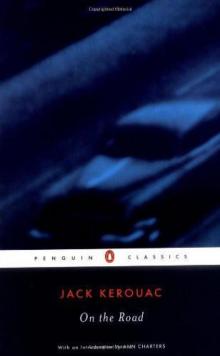 On the Road
On the Road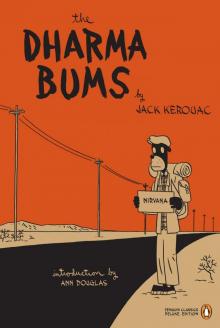 The Dharma Bums
The Dharma Bums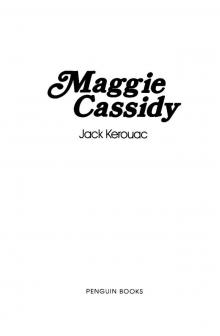 Maggie Cassidy
Maggie Cassidy Big Sur
Big Sur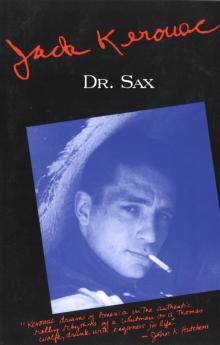 Dr. Sax
Dr. Sax Vanity of Duluoz: An Adventurous Education, 1935-46
Vanity of Duluoz: An Adventurous Education, 1935-46 The Sea Is My Brother
The Sea Is My Brother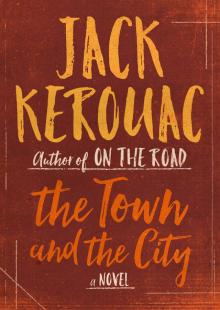 The Town and the City: A Novel
The Town and the City: A Novel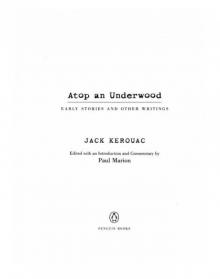 Atop an Underwood: Early Stories and Other Writings
Atop an Underwood: Early Stories and Other Writings Desolation Angels: A Novel
Desolation Angels: A Novel Book of Sketches
Book of Sketches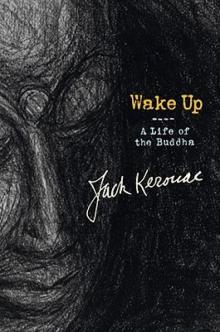 Wake Up: A Life of the Buddha
Wake Up: A Life of the Buddha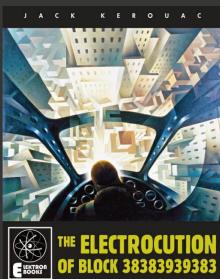 The Electrocution of Block 38383939383
The Electrocution of Block 38383939383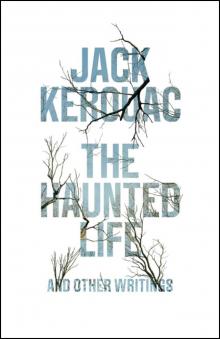 Haunted Life
Haunted Life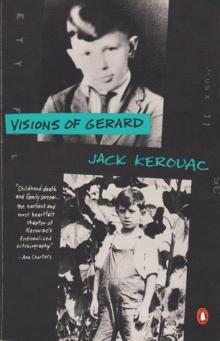 Visions of Gerard
Visions of Gerard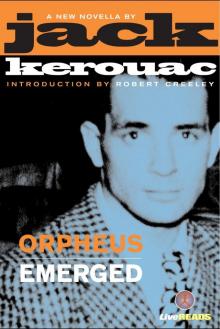 Orpheus Emerged
Orpheus Emerged Book of Blues
Book of Blues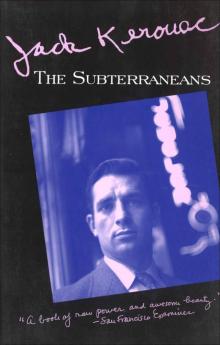 The Subterraneans
The Subterraneans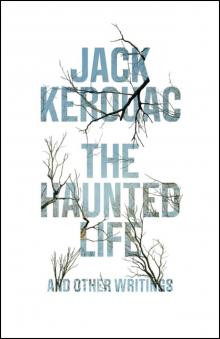 The Haunted Life
The Haunted Life The Unknown Kerouac
The Unknown Kerouac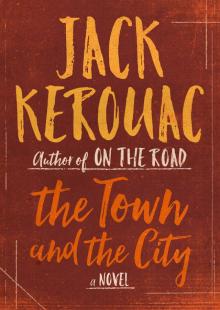 The Town and the City
The Town and the City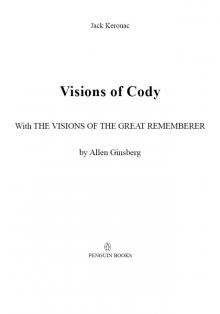 Visions of Cody
Visions of Cody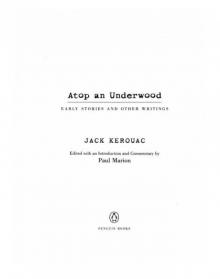 Atop an Underwood
Atop an Underwood Lonesome Traveler
Lonesome Traveler Jack Kerouac and Allen Ginsberg
Jack Kerouac and Allen Ginsberg Vanity of Duluoz
Vanity of Duluoz Desolation Angels
Desolation Angels On the Road: The Original Scroll: (Penguin Classics Deluxe Edition)
On the Road: The Original Scroll: (Penguin Classics Deluxe Edition) The Sea Is My Brother: The Lost Novel
The Sea Is My Brother: The Lost Novel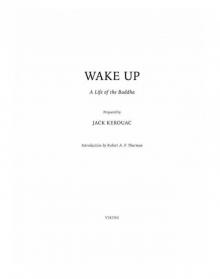 Wake Up
Wake Up The Poetry of Jack Kerouac
The Poetry of Jack Kerouac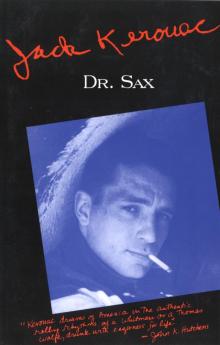 Doctor Sax
Doctor Sax